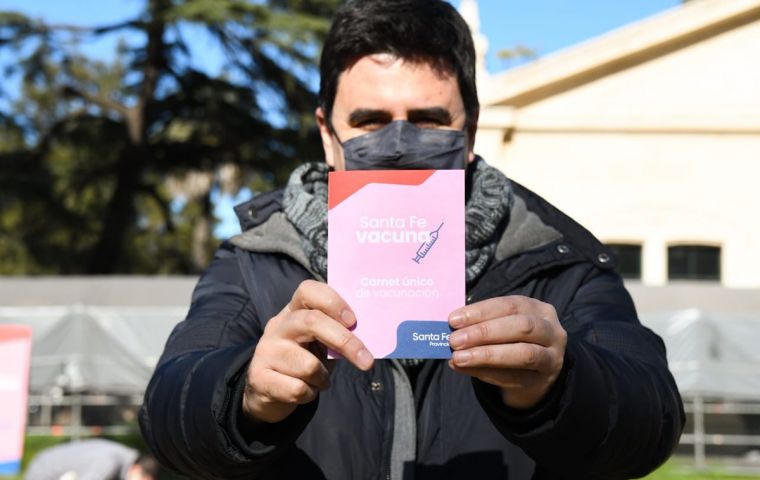MercoPress. South Atlantic News Agency
Argentina: Grandmothers of Plaza de Mayo hope to find more missing grandchildren thanks to covid-19 vaccination pictures
 Pictures of people getting vaccinated may lead to finding some of the 300 missing grandchildren
Pictures of people getting vaccinated may lead to finding some of the 300 missing grandchildren Argentine victims of disappearances and child abductions during the military dictatorship between 1976 and 1983 are relying on vaccination efforts to help them find some of their 300 missing grandchildren.
So far, 130 children who were born in captivity have been restored through DNA testing to their blood families thanks to the efforts of Abuelas de Plaza de Mayo (Grandmothers of the Plaza de Mayo), but 300 others are still unaccounted for.
The humanitarian organization hopes that the current anti-coronavirus vaccination campaigns nationwide will help find some of the kids which were stolen at birth and handed over to adoptive families, Al Jazeera reported Sunday.
Under the motto “Help us find you” the Abuelas are asking people aged between 38 and 45 years old to post photos of their jabs on social media with the hashtag #UnaDosisDeIdentidad (One Dose of Identity).
The posts are accompanied by messages urging anyone born between 1975 and 1980 and who has doubts about their identity to reach out.
“We saw it as an opportunity because, in a short period of time, the grandchildren we’re looking for will be paying attention because they are getting vaccinated,” Belen Altamiranda Taranto, the 88th identified grandchild, who now works with Abuelas de Plaza de Mayo in the city of Cordoba, told Al Jazeera.
This year, the government also launched a campaign targeting Argentines living abroad under the banner “Argentina Te Busca” – Argentina is Looking For You. Several people have discovered their true identities after they moved overseas as adults to the Netherlands, the United States and Spain, while others were found at a younger age in neighbouring Chile and Uruguay.
Women who were pregnant at the time of their disappearance gave birth in clandestine detention centres and their babies were then systematically given to families who either supported the military or did not ask questions about the child’s origins.
DNA testing was not available until the late 1980s, so those responsible for the abduction of babies could have not guessed there would be a way to identify the true bloodlines of the newborns they stole.
It has taken years to generate a collective awareness of what has happened and time is running scarce. “There are very few grandmothers left,” the 44-year-old Taranto was quoted by Al Jazeera as saying. “They are very old and it’s a feeling of great sadness and impotence to see them leave us, without having been able to find their grandchildren or the bodies of their children.”
Taranto met both sets of grandparents before they passed away. “It’s not a cliche, but you feel a sense of freedom – I’m free to do what I want to do with my story,” said Taranto, whose disappeared parents Cristian Adrian and Natalia Vanesa were members of the Workers’ Revolutionary Party.
Anyone who has doubts about their identity can contact Abuelas de Plaza de Mayo through their website.
Source: Al Jazeera




Top Comments
Disclaimer & comment rulesCommenting for this story is now closed.
If you have a Facebook account, become a fan and comment on our Facebook Page!